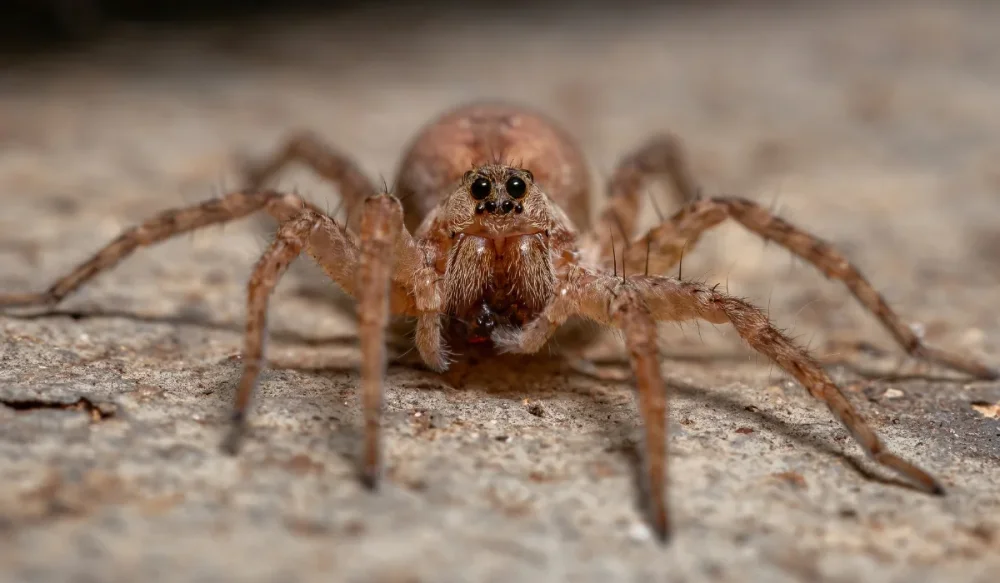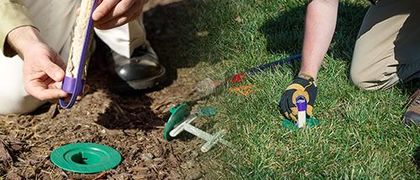How to Get Rid of Wolf Spiders in Iowa

You’ve probably seen them scurrying across the garage floor or lurking in the basement, big, fast, and just creepy enough to make you pause.
We're talking about wolf spiders. While they’re not classified as dangerous spiders like brown or black widows, they can still give you a serious case of the heebie-jeebies.
If you're wondering how to get rid of wolf spiders in Iowa homes, this guide breaks down proven strategies that work in real Iowa conditions.
Key Takeaways
- A wolf spider is a big, fast spider that hunts bugs and is often mistaken for other spiders.
- Bugs inside your home attract female wolf spiders who carry egg sacs and raise baby spiders in dark places.
- Tall grass, firewood, and cracks around your house give wolf spiders space to hide and ways to get inside.
- A pest control plan from Miller can get rid of spiders and keep them from coming back each season.
Start with Spider Identification
When it comes to pest control, the first step is always accurate identification. Wolf spiders are often confused with the brown recluse spider or fishing spider.
But here’s the key difference: they don’t use webs to catch prey. Instead, they hunt like jumping spiders, using speed and stealth.
The Carolina wolf spider, known for its large size and body length that can reach over an inch, is one of the most common species in North America.
If you’re unsure about the spider you’ve spotted, Iowa State University Extension has helpful resources, or you can ask a local pest control pro for help.
Eliminate Insects They Feed On
Wolf spiders eat arthropods like beetles, ants, and even other spiders, including orb weavers, sac spiders, and grass spiders.
If your home has a steady supply of bugs, you’re inviting female wolf spiders in to lay egg sacs and raise spiderlings. That’s especially true in cluttered garages and unfinished basements.
Our MillerGuard pest control plans are designed to break that food chain.
We target everything from woodlouse (a common prey item) to funnel weaver spiders and other small bugs, cutting off the spider’s food supply.
Seal Up Entry Points, Especially in Garages and Basements
Wolf spiders tend to build burrows outdoors, but in colder months, they’ll migrate indoors, often ending up in basements, crawl spaces, or cluttered garages. Their athletic build and large size make them capable of slipping through surprisingly small cracks.
Walk around your home and look for gaps near door frames, window wells, utility openings, and foundation walls. Sealing these off helps prevent wolf spider bites and stops them from moving in during fall.
Maintain a Tidy Yard to Discourage Outdoor Burrows
Outdoors, wolf spiders are drawn to tall grass, leaf piles, and woodpiles. These spots provide shade, moisture, and great hunting grounds.
If you’re in a rural part of Iowa or even in suburban areas like West Des Moines, keeping your yard trimmed and clutter-free is one of the best things you can do to reduce spider activity.
Clear away mulch beds, move firewood away from your home, and mow regularly to keep them from establishing burrows right outside your foundation.
Remove Egg Sacs and Spiderlings Promptly
One of the reasons wolf spider populations can explode is that female wolf spiders carry their egg sacs with them and then carry the hatched spiderlings on their back.
This means one spider can turn into dozens if not handled quickly.
Use a vacuum to remove visible sacs and spiderlings from corners, wall joints, and furniture edges, then toss the vacuum bag outdoors immediately.
Clean Regularly, Especially in High-Risk Areas
A cluttered basement or messy garage is prime real estate for all kinds of spiders.
We’re talking about cellar spiders, orb weavers, common house spiders, and, of course, wolf spiders. Even if they’re not setting up webs, they use these spaces for shelter and hunting.
Vacuuming corners, clearing out storage piles, and dewebbing can make your home less attractive to all kinds of spiders.
Work with Local Pest Control Experts in Des Moines and Beyond
If you’re still seeing wolf spiders despite your best efforts, it’s time to call in the pros.
At Miller Pest & Termite, we understand the local spider scene, from the jumping spider that startled you on the porch to the wolf spider hiding behind the water heater. Our pest control specialists know how to identify spider hot spots and apply treatments that are safe for families and pets.
We offer year-round plans that don’t just treat active spider infestations. They help prevent them from coming back by managing the entire spider life cycle.
Call us now or schedule your inspection today to keep wolf spiders and other arachnids outside, where they belong.
Get Help Now!







